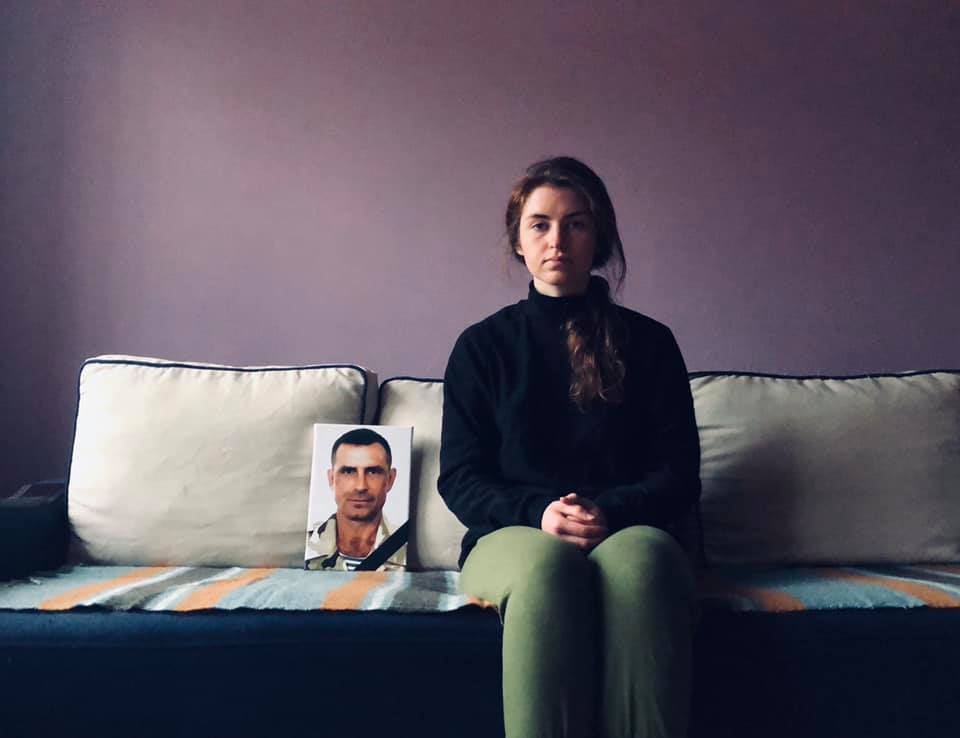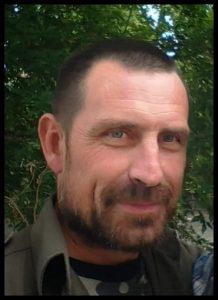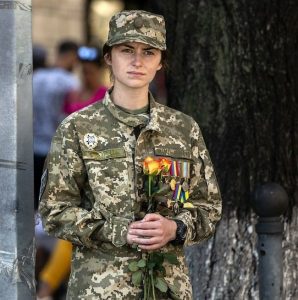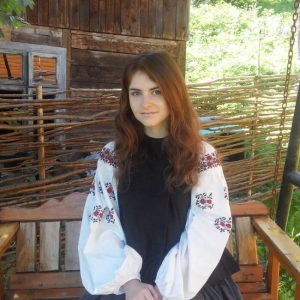Yuliya Mykytenko, an officer in the Armed Forces of Ukraine, remembers how her father carried her in his arms all the way to the hospital; how he was badly injured during the Maidan and given a place of respect and honour where the bodies of the Heavenly Hundred were being gathered; about his decision, when he was a platoon commander, to ignore orders and help out when a military helicopter carrying Major-General Kulchytsky crashed; about the motivation behind his self-destructive protest; and about her hopes for a meeting with Volodymyr Zelenskyy.
My father carried me in his arms to the nearest hospital
I remember we were at our dacha. Dad’s on the bed. I’m lying beside him with my back to him. He’s rubbing my back and singing a folk song: “How bright the moon and stars make the night”.
I remember shelling peas with my grandmother, eating too many of them and feeling terribly sick. I recall how dad picked me up in his arms and ran eight kilometres to the nearest hospital.
In the difficult 1990s, my mother worked at a currency exchange kiosk. My father worked there as a security guard. That’s how they met.
I was five years old when my parents divorced. Dad needed to find happiness elsewhere. He was impulsive, quick-tempered and charismatic. He kept in touch with us and supported us financially. There were times when I needed him, but now I understand that in his absence I grew up faster.
During the Maidan protests, my uncle carried my dad away from among the dead heroes
When the Maidan began, my father participated from the outset. He knew about my involvement with the students, when the “Mohyliantsi” (students from the National University of Kyiv-Mohyla Academy-Ed) were first getting organized. We walked from university to university rallying the students and encouraging them to join us. He supported me completely.
We saw each other for the first time on the Maidan on November 30, the night the students were beaten by the police. Later, I learned that my dad was also there, and he saved several of the students. He knew the back alleys of the city very well, and he led them to safety along these streets.
When the barricades were erected on the Maidan, and there was a showdown with the security forces, my father was in charge of the 19th Sotnya. I was in the 16th Sotnya. Although our sotnyas were close, we rarely saw one another, as we were occupied with the affairs of our respective groups.
One day, I learned that our activists had captured a small group of security forces near the Ukrayinsky Dim. My dad spoke up in their defence, saying that there might come a day when they’d be on our side. His words proved to be prophetic. When the Russian aggression began, sure enough there he was, fighting alongside those Berkut officers at Karachun Mountain (Sloviansk, Donetsk Oblast-Ed
).
It was on that day on the Maidan that my dad suffered a contusion when a stun grenade exploded. He was unconscious, and was brought to the place where the bodies of the Heavenly Hundred were being gathered. My uncle took my dad from among the dead. A doctor checked him out and told him to rest for a month, but the next day he was back with his sotnya.
I understood that my father had finally found his calling
When the chaos began in Crimea, we both understood the gravity of the situation. The Maidan activists began entering the ranks of the National Guard. Neither my mother nor I were surprised when my dad joined them. Until war affects you personally, it is not possible to comprehend what it really is.
We were there the day father took his oath. It was clear to me that he had finally found his calling. As he’d completed military service in the past (from 1989-1990 he was in an armoured regiment, serving in Hungary) and also military training as a junior sergeant, he was immediately promoted to platoon commander.
His combat experience began near Sloviansk at Karachun Mountain. We never spoke about that time; we never had the opportunity to do so.

I wouldn’t see him again until he was convalescing at a hospital in Kharkiv. When the helicopter carrying Kulchytsky (Major-General Serhiy Kulchysky, head of training at the National Guard- Ed), was shot down by the Russian mercenaries, father’s platoon set out without permission to help with the evacuation. They saved one crewman’s life, and collected the remains of the dead.
When the evacuation convoy was returning to the base, they hit a mine. Despite his protective gear, my dad was sent flying head first, and landed on his neck. The doctors were surprised that he’d survived. We were advised to get to the hospital quickly, in case he didn’t live long. I went with my brother, uncle, and his wife. When we met him, my father was smiling, and asked us why we were so worried.
After I joined the army, my dad began to open up to me about his experiences and what he thought about the combat operations. Before that time, he probably thought he shouldn’t traumatize me with such information. He spoke explicitly about the moskali. Until the war began, he, like many other Ukrainians, considered Russians to be a friendly nation. We even have distant relatives in Moscow, and we kept in touch with them before the war.
Father loved and respected my husband, Illya. He was killed in the Donbas. Dad couldn’t imagine how I managed to endure such a loss, although we rarely expressed our deep emotions. He treated me more like a combat sister than a daughter. He was able to speak frankly with me about the situation at the front, share his thoughts about the war, and openly talked about the situation in the country. He didn’t speak this way with my brother.
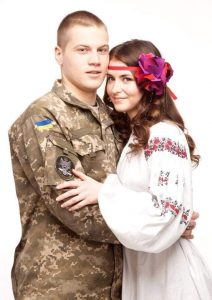
My father never really returned from the war
It seems to me that my father never really returned from the war. He received invalid status after his trauma, and that was the end of his active service in the National Guard.
Following the deaths of your brothers-in-arms, your sense of justice sharpens keenly. Everybody knows that. You begin to assess events in another manner. I saw this reaction in my father. Moreover, he was a man of action, unable to sit in one place. In his spare time, he took part in volunteer activities, participating in protest rallies and veterans’ marches.
My father, along with many others, had a low opinion of Zelenskyy. I recall when the Trilateral Contact Group first met in 2019 and the government decided to pull back our troops. My dad was angry and hurt. Svitlodarsk Bulge was within this area of retreat... and that’s where my husband was killed (Illya Serbin, February 22, 2018-Ed). My dad asked me:
“How can this be? How can we possibly give up territories that were defended with the blood of our family and friends?”
I couldn’t answer his question. During the last month of his life, he often came to the Presidential Office, asking to meet Zelenskyy. He also appealed to his brothers-in-arms to join him. The government didn’t hear his request, neither then nor to this day.
I simply want Ukraine to be independent!
I had some days off in October, so I went to see my fiancé in Lviv. On the October 11, my brother called, saying he had something urgent to tell us. Dad was in hospital, in the burn unit; he had set himself on fire on the Maidan. My fiancé found the news on a website - an unidentified man had set himself on fire on the Maidan for some unknown reason.
I was in shock. I took the evening train back to Kyiv. I was full of anger and denial about what had happened.
I couldn’t understand how anyone could commit such an act. I’d had no indication or warning that my father was in such a state of mind. What’s more, everyone who spoke with him on the evening of October 10 swears that there were no tell-tale signs as to his decision. In fact, he was talking about undergoing treatments, and he had plans to go to our dacha and help my brother. I think my father knew very well that if anyone had the slightest idea of what he was planning, they definitely would have prevented him.
Everything points to the fact that my father was completely committed and undertook this action to make a political statement. First, he specifically chose that location. The Maidan has always been a symbol of protest. Second, the way he died. There are definitely more painless ways to kill yourself. Third, in the final moments of his life, when he was being consumed by flames, he was shouting that “Zelensky prevents us from fighting”. Four, a post he made five minutes before starting his protest: “It is now 3:25 and I simply want Ukraine to be independent”. The video shows how well planned this was and how quickly everything happened. I believe that his act was meant as a wake-up call for the government and the nation, for our people who have lost all empathy in this flood of information around us. It is now my job to continue speaking and honouring his memory.
I’ve been asked to make a documentary film about my father. The trailer will be ready soon, and I’ll be raising funds for the project. I can’t let this be forgotten. Not because he was my father, or because he decided on such a particularly painful death in such a symbolic location and date (the eve of the Feast of Protection of the Mother of God and Defender of Ukraine Day). None of these details are coincidental. I don’t have the moral right to allow any of us to forget what happened.
If my father had been there, he would have sent those commanders packing!
I’ve requested a meeting with the president, but so far there has been no response, although I’m certain that the Presidential Office has my telephone number. My superiors have shown the greatest understanding, but I wouldn’t attend any meeting in uniform. I would speak as a veteran, as a daughter, and as a citizen.
For most people, the prospect of a wartime death is very remote. I doubt if anyone in our president’s circle has had such an experience. We have little in common with him regarding values; to him, all these deaths are merely numbers. Statistics. I wish he’d spend more time with people for whom these losses are anything but statistics. It is grief and we live with this pain every single day. His decisions are only making it more painful.
I would like to remind Volodymyr Zelenskyy that he speaks on behalf of 43 million people, for whom his decisions have grave consequences. Absolute consequences. Remember Yaroslav Zhuravel, who was abandoned to die in enemy territory? I’m convinced that had my father been there, he would have sent those commanders packing and he himself would have crawled out to rescue that wounded soldier...because he had done something similar in the past.
I also want to show the president that it’s natural and necessary to talk with veterans. We’re not obsessed with killing. Why is he so afraid of communicating with his people?

